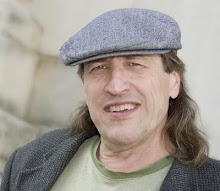It all looks so clean this time of year, the pipes from the chemical plant spewing less poison, though the steam from the fabric mill swirls out over the surface like fog, swirling around the remnants of snow that look like white tuffs of cotton or wool, the wood chips of fallen trees scattered over them. Nobody notices the red stains on the concrete near the mouth of each pipe, red that in other seasons glistening with poisonous purple and green.
I jog up River Drive each morning, always pausing here at the foot of the Dundee Dam, where the manmade waterfall keeps back the heaviest of the water flow while at its foot stones pepper the floor the river, along small islands thick with trees and wilting reeds, sea gull swirling overhead in a perpetual hunt for food, searching for the breaks in the ice where they might dive deep and come up with the fish that bury themselves in the warmth of the mud at the bottom.
In my head, I imagine the conversations that must take place among them, this battle of the fittest, and wonder just how it must feel to be truly free, and how their embrace their own lives, these quaint and not so innocent souls living in a wilderness framed in concrete, each generation witnessing the slow decline what was built here to contain them.
My grandfather knew this river as did his grandfather, building houses along its shores to accommodate the flow of Lower East Side Jews and Italians to work in the mills, his time passing into the time of my uncles who could still swim in this river considered among the most polluted in the world, leaving me as the next generation to stand on this shore, to greet this generation of seagulls and swallows, to somehow get from them the secret truth none but a few have found before me.
And still the mills spout smoke, painting the gray sky grayer, me, standing in awe of it as if in a great temple, the churn of unseen machinery like a chant, echoed a bit by the grind of truck gears over the bridge or the hum of the exhaust fan from Service Diner’s kitchen, the scene of coffee and cooking mingling with diesel and stream. It is music I can barely comprehend, an essay filled with metaphors I do not understand, and yet I dare not miss a note or a shift in a paragraph, unable to keep up with it all as the water tumbles over the fall, losing me in the mists.
I don’t even know why I insist on stopping here, staring down at the membrane of ice, like a thinning overstretched balloon, ready to burst, giving birth to something I can’t imagine but which has always existed here, something I need to be apart of, and yet is more mirage than real.
A whistle blows from one of the mills – more steam rising. Men in work clothes come out, some carrying brooms, others tools, still others lunch buckets for a meal still two hours away, the mid-morning break that lets them out, as they sit or stand on the walls on the far side of the river, drinking coffee from vacuum bottles, each lighting a cigarette and so adding to the gray sky with each exhaled breath.
If they notice the river, it is not in the same way I do.
Their memories are not my memories, even though many of my memories are really the memories of family members who told me of what life was like here, the uncles who sailed this place in boats to fish, the cousins who scurried along the shore for bottles to return, my mother and father carrying me across from home to home when I was an infant, too vague a memory to be a memory at all, having married within view of the bridge near where I stand now, living their lives a century and a half after Washington retreated here.
The workmen cannot see the same thing I see, the spirit of the river stirring under the ice, the smear of gray gull wings against the gray sky, the slight color of pink from where the sun just barely shines through the thickening clouds, a sun just warn enough at times to crack the ice only to have the night refreeze it in an endless ritual that lasts until spring.
The whistle blows again; the workers vanish, one after the other, closing their coffee urns just as I finish the last drops in the now-cold cup I hold, they returning to labors inside the halls of that massive world of brick, while I climb back up to the road for the long jog back home and then to school, and work later, covering ground my ancestors covered, doing all that my ancestors have done, the gray sky growing grayer as I jog, hinting perhaps of snow.









